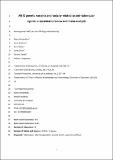Files in this item
NAT2 variants and toxicity related to anti-tuberculosis agents : a systematic review and meta-analysis
Item metadata
| dc.contributor.author | Richardson, M. | |
| dc.contributor.author | Kirkham, J. | |
| dc.contributor.author | Dwan, K. | |
| dc.contributor.author | Sloan, D. J. | |
| dc.contributor.author | Davies, G. | |
| dc.contributor.author | Jorgensen, A. L. | |
| dc.date.accessioned | 2019-11-14T17:30:03Z | |
| dc.date.available | 2019-11-14T17:30:03Z | |
| dc.date.issued | 2019-03-01 | |
| dc.identifier | 262877095 | |
| dc.identifier | 14d0ad1b-9ce7-46b8-a67d-89c706528090 | |
| dc.identifier | 85062998049 | |
| dc.identifier | 30871660 | |
| dc.identifier | 000461389800006 | |
| dc.identifier.citation | Richardson , M , Kirkham , J , Dwan , K , Sloan , D J , Davies , G & Jorgensen , A L 2019 , ' NAT2 variants and toxicity related to anti-tuberculosis agents : a systematic review and meta-analysis ' , International Journal of Tuberculosis and Lung Disease , vol. 23 , no. 3 , pp. 293-305 . https://doi.org/10.5588/ijtld.18.0324 | en |
| dc.identifier.issn | 1027-3719 | |
| dc.identifier.other | ORCID: /0000-0002-7888-5449/work/64361370 | |
| dc.identifier.uri | https://hdl.handle.net/10023/18925 | |
| dc.description.abstract | BACKGROUND : Tuberculosis (TB) patients receiving anti-tuberculosis treatment may experience serious adverse drug reactions (ADRs) such as hepatotoxicity. Variants of the N-acetyltransferase 2 (NAT2) gene may increase the risk of experiencing such toxicity events. OBJECTIVE : To provide a comprehensive evaluation of the evidence base for associations between NAT2 variants and anti-tuberculosis drug-related toxicity. METHOD : This was a systematic review and metaanalysis. We searched for studies in Medline, PubMed, EMBASE, BIOSIS and Web of Science.We included data from 41 articles (39 distinct cohorts of patients). We pooled effect estimates for each genotype on each outcome using meta-analyses stratified by country. RESULTS : We assessed the quality of the included studies, which was variable, with many areas of concern. Slow/intermediate NAT2 acetylators were statistically significantly more likely to experience hepatotoxicity than rapid acetylators (OR 1.59, 95%CI 1.26-2.01). Heterogeneity was not detected in the overall pooled analysis (I2 = 0%). NAT2 acetylator status was significantly associated with the likelihood of experiencing anti-tuberculosis drugrelated hepatotoxicity. CONCLUSION : We encountered several challenges in performing robust syntheses of data from pharmacogenetic studies, and we outline recommendations for the future reporting of pharmacogenetic studies to enable high-quality systematic reviews and meta-analyses to be performed. | |
| dc.format.extent | 13 | |
| dc.format.extent | 1072220 | |
| dc.language.iso | eng | |
| dc.relation.ispartof | International Journal of Tuberculosis and Lung Disease | en |
| dc.subject | Tuberculosis | en |
| dc.subject | Pharmacogenetics | en |
| dc.subject | Adverse events | en |
| dc.subject | Evidence synthesis | en |
| dc.subject | QH426 Genetics | en |
| dc.subject | RM Therapeutics. Pharmacology | en |
| dc.subject | Infectious Diseases | en |
| dc.subject | Pulmonary and Respiratory Medicine | en |
| dc.subject | 3rd-DAS | en |
| dc.subject | SDG 3 - Good Health and Well-being | en |
| dc.subject.lcc | QH426 | en |
| dc.subject.lcc | RM | en |
| dc.title | NAT2 variants and toxicity related to anti-tuberculosis agents : a systematic review and meta-analysis | en |
| dc.type | Journal article | en |
| dc.contributor.institution | University of St Andrews. School of Medicine | en |
| dc.contributor.institution | University of St Andrews. Infection and Global Health Division | en |
| dc.identifier.doi | https://doi.org/10.5588/ijtld.18.0324 | |
| dc.description.status | Peer reviewed | en |
This item appears in the following Collection(s)
Items in the St Andrews Research Repository are protected by copyright, with all rights reserved, unless otherwise indicated.

